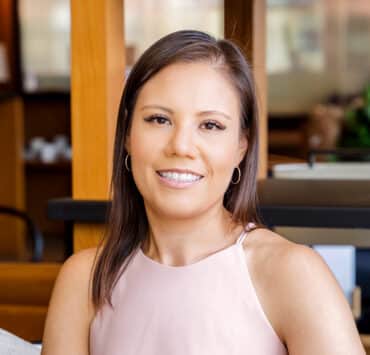|
Getting your Trinity Audio player ready...
|
Ignacio Martinez, a staff economist at Google, speaks on data’s behalf to inform business decisions. Born and raised in Argentina, he grew up understanding inflation, unemployment, and uncertainty firsthand. His education in economics served as his “passport to world”; now, as a technology professional in the US, he pulls from his international lived experiences to communicate findings clearly and works collaboratively with an array of teams.
Martinez employs a Bayesian framework to sift through an abundance of “imperfect information” and thereby offer economic advice for the best possible decisions. He knows what he knows and learns what he doesn’t. He wears many hats. And, most importantly, simultaneously growing his family and his career means cultivating a work-life balance.
Tell me about your background and walk me through your career trajectory. How did you find yourself working in economics?
I am the youngest of three brothers, born and raised in Tucumán, Argentina. Growing up in a middle-class family in Argentina, I experienced every sort of economic crisis during my most formative years. That is, a lot of inflation, unemployment, and uncertainty about the future. When I was in kindergarten, I remember getting a bit of Argentinian money from my mom, and immediately walking to my dad to buy some dollars because of hyperinflation.
In Argentina, education is a constitutional right, which means that public education, including undergraduate degrees, is free. Therefore, as long as [I attended] my local public university, I could study whatever I wanted.
Unlike the US, in Argentina you declare your major on day one. If you change your mind [later on], you start your studies over from scratch. Following my older brother’s footsteps, I studied economics because that path was clear to me. This was a hard decision because, [although] I liked other subjects better, my objective at the time was to study something that would allow me to eventually leave Argentina and find somewhere where life was less uncertain.
After finishing my undergraduate education in Argentina, I moved to the US to pursue my PhD in Economics at the University of Virginia, where I became interested in causal inference. After that, I joined Mathematica Policy Research, where I worked as a researcher for almost five years.
There, my research expanded to public policy topics such as education, health, and labor. In Argentina, we frequently discussed public policy at the dinner table (even when I was a little child), this cultivated my interest in helping policymakers make better decisions using data.
Then, in 2019, I joined the Chief Economist’s team at Google. At Google, I use the same toolkit for public policy research, but to help Google make business decisions.
Within the field of economics, what do you specialize in? Have your interests changed over the course of your career?
My field is Applied Microeconomics—particularly causal inference. My interests have changed a lot over the years. When I started my studies at the University of Virginia, I planned to follow in my brother’s footsteps and [specialize] in macroeconomics. I realized, however, that applied microeconomists asked more interesting questions.
For my dissertation, I used a massive online open course (MOOC)—new at the time—as a research laboratory to learn how behavioral economic insights could be used to improve learners’ outcomes. At Mathematica, my work initially focused on education and labor, the areas I knew best.
[I started working in health research after discovering how interesting the toolkit was for this area] and I applied what I learned to my research in other areas. By the time I left Mathematica, I was [utilizing] this toolkit to better help decision-makers be data-driven.How has your international education (first your bachelor’s degree in Argentina and later your PhD in the United States) informed your work as an economist?
My lived experiences give me a [unique] perspective and heavily influence how I think about topics I find interesting—including inflation, unemployment, recessions, defaults, and uncertainty.
If universities [had not been] tuition-free in Argentina, it is possible I would not be where I am today. This [likely] explains why I was interested in the economics of education. My education is my passport to the world, and I am convinced that it is the best tool to solve many of society’s problems.
What attracted you to joining Google? Did you always plan to apply your expertise in the technology industry?
I always liked technology; however, I never imagined that I would work in the tech sector.
I met my wife at my previous job. One night while having dinner, I told her I could not imagine finding a better job than the one I had. Her response: if Google offered me a job, I would take it in an instant. Soon after, Google published an ad [seeking] someone with my profile to work on the chief economist’s team. Google’s chief economist, Hal Varian, is a legend among economists. To be honest, I would not have applied for the job without my wife’s encouragement.
Describe the scope of your current role as Staff Economist.
Our team is an independent internal consulting team. My main job is to speak on data’s behalf to help decision-makers at Google. I also work on other projects I find interesting. For example, I was a subject matter expert for the data analytics Google career certification.
One of the great things about working at Google is that I get to wear multiple hats . . . and with intelligent people with backgrounds different from mine.
Talk to me about current initiatives you’re excited about right now. How do you think these initiatives will impact Google and potentially the field of economics at large?
I’m most excited about my new role managing other Googlers. I believe becoming a manager is the best way to increase my impact at Google. Also, people are embracing a Bayesian framework for informing business decisions, and I believe this is a trend that will continue to grow in popularity both inside and outside Google.
Have you had to overcome any challenges during your time at Google? Reflecting back, have you learned any lessons from these experiences?
I [have] overcome many professional and personal challenges since joining Google.
Professional challenges include learning new methodology to answer questions [and] communicating difficult findings from studies. My personal challenges are [like many people’s challenges over] the last 2+ years. I have a 2-year-old who got COVID-19 twice. Soon after I started at Google, my daughter was born. Soon after that, we started working from home—[and] with an infant in a small apartment, it was challenging. We all got COVID-19 when she was just three months old. Google did a great job supporting us. I’m very lucky to have a job that I enjoy and which offers great work-life balance.
From your point of view, what makes economics such an important field for the Latin community? Do you have any advice for the next generation of Latinos considering a career in economics?
A PhD in Economics gives you a unique toolkit to think about the world. Josh Angrist famously said: “Econometrics is the original data science.”
In addition to technical skills, the tech sector needs your soft skills. There is little value in having a great econometrics model to answer a question if you cannot communicate your findings clearly to your audience such that they can apply the learnings. Teaching while doing your PhD can be a great way of learning how to communicate difficult concepts to non-technical people.
If you have the opportunity [to take] Bayesian statistics courses, you should. I strongly believe that the Bayesian approach is more useful than the traditional frequentist approach for the type of work I do.
What’s the best way economists can get opportunities working for Google and/or similar companies?
If you are a graduate student, I highly encourage you to do a summer internship at Google. If you have work experience, keep an eye on careers.google.com.
How would you describe the mentality needed to be successful in your role?
My role is to speak on data’s behalf to help people make the best possible decisions. The quality of evidence is a continuum, and decisions must be made at some point in a world with imperfect information. That means that you must be comfortable thinking in bets. If someone wants to know if A is better than B, telling them that “you cannot reject the null hypothesis that they are the same, and that that does not mean that you are saying that they are the same” is not helpful at all.
Keep in mind that reputation is a very valuable asset. The best way to gain trust is to be honest about what you know and don’t. “The lure of incredible certitude” by Charles Manski should be required reading for all economists and data scientists. I also encourage economists in the tech sector to listen to this Susan Athey interview.
What goals have you set for yourself looking to the future?
Becoming the best possible father and husband. This means prioritizing a work-life balance, and I’m lucky that Google allows me to do that. Workwise, my hope is to keep growing as a manager so we can help more people make good decisions.

